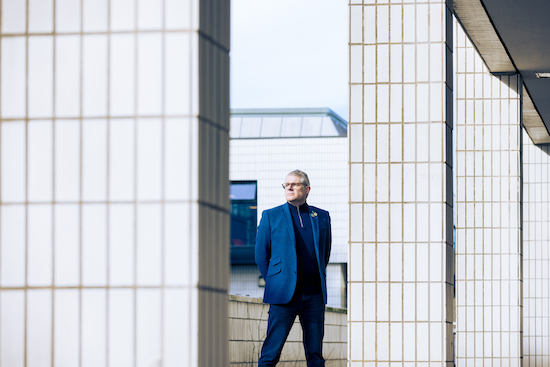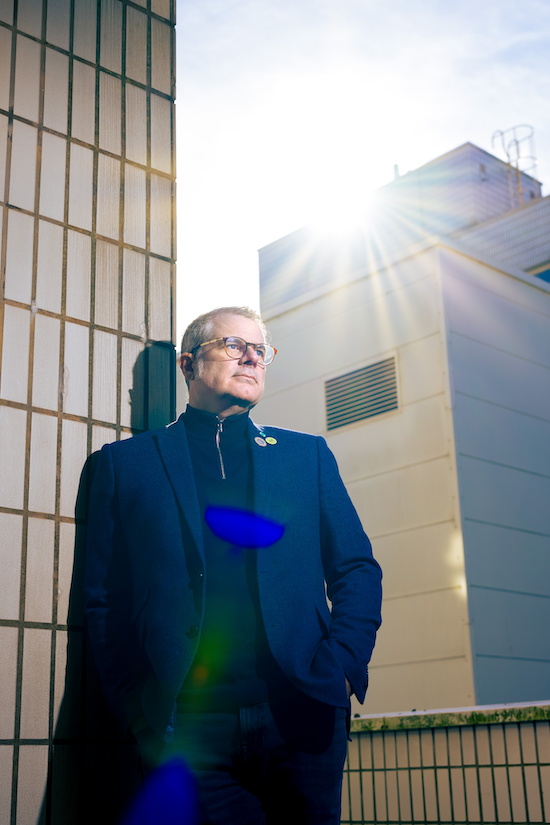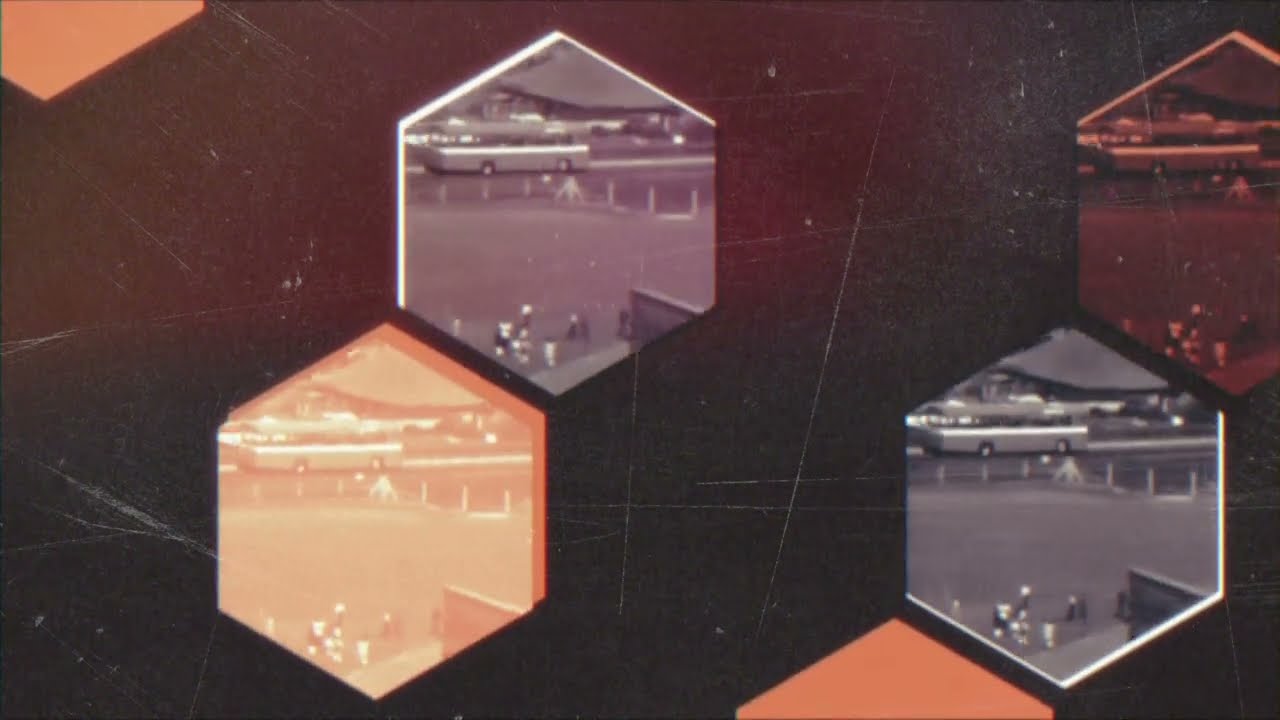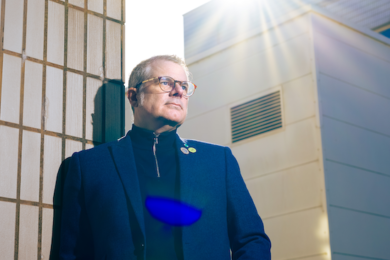Photos by Richard Lea-Hair
While the debate still rages as to who actually came up with the phrase – the writers Robert Graves and Laura Riding, and philosopher Paul Valéry are among the prime suspects – what is certain is that the future ain’t what it used to be. Whatever it was that we thought was coming – sunlit uplands, anybody? -– it certainly wasn’t the run down and mismanaged economic misery that we’re enduring now. And it’s precisely this deception that beats at the heart of Warrington-Runcorn New Town Development Plan.
It’s the creation of Gordon Chapman-Fox, whose retro-futurist, instrumental electronic music evokes a time that simultaneously drew away from the gravitational pull of the Second World War while planning for a bright new future that left behind the pockmarked urban landscapes that still bore the scars of that conflict. These were to be the new living areas designed to make life easier through careful town planning that would cut pollution thanks to reliable public transportation; from shops, libraries and leisure centres, all amenities would be at hand. These were the New Towns. And yet, far from being the utopia they were designed to be, they would became as run down and dysfunctional as the areas they were supposedly leaving behind.
The TV adverts from the 1970s that promoted New Towns such as Warrington and Runcorn left a major impression on the young Gordon Chapman-Fox. Here was a view of an urban utopia soundtracked by squelchy, analogue synths that signposted the way forward.
“I made the first album, Interim Report, March 1979, harking back to the childhood memories of those adverts,” the softly spoken Chapman-Fox tells tQ. Its follow-ups – 2021’s People & Industry and 2022’s Districts, Roads, Open Space – would develop those themes with music that seemed to be reaching from the past to signpost the disappointment of what was to follow.
His new album, The Nation’s Most Central Location, is Warrington-Runcorn New Town Development Plan’s most fully realised work to date. With music that ranges from the lachrymose to the frightening with a semblance of hope sandwiched in between, the album explores the relationship between England’s North and South to reflect on 40 years of broken ‘levelling up’ promises.
“It’s not so much the North-South divide; it’s more the North versus The Establishment,” elaborates Chapman-Fox. “You know, the structures in Westminster or the City Of London that just funneled all the money from these areas and took it away. I think the South is now, after 13 years of the Tories, having the same sort of harrowing that the North has been having for the last 40 years. It doesn’t strike me as a North-South issue; it’s about those who are in power and those who are not in power and have been abused by the system.”
What with Warrington-Runcorn New Town Development Plan dealing with social history through the medium of instrumental music, tQ wonders what comes first: the music or the concept?
“I’m usually continuously making music, and when I’ve done a couple of tracks, a concept will usually occur to me,” explains Chapman-Fox. “I think, ‘Oh, it’s beginning to come together into something,’ and I’ll create the artwork and create the concept at that point. And then the concept will flow into the creation of the rest of the album. It’s not like a concept that’s retroactively applied onto music. It comes midway through the process.”
What is palpable throughout The Nation’s Most Central Location is a sense of dystopian menace, a feeling that something has gone horribly wrong. And by focusing his attentions on the once New Towns of Runcorn and Warrington, the mood of melancholia is palpable and recognisable to anyone who’s grown up in these environments.

“The music resonates with anyone who ever actually watched Doctor Who in 1970s and 80s,” says Chapman-Fox. “People who actually grew up in New Towns have contacted me, as well: this sounds exactly like it was not just Warrington or Runcorn, but also Basingstoke or Crawley.” He adds: “One of the reasons why the music has resonated so well is, partially, because I try and look at contemporary ideas and how they relate to 40 or 50 years ago.”
The replication of analogue synths from the 1970s has also gone some way to juxtaposing the view of the future from the past. “It’s very much a starting point,” says Chapman-Fox. “I try and use the same tones and instruments as close as I can get them and the equipment to sound the same, even though it’s all been recorded on my MacBook. There is a very tangible quality to the sound of an old Moog synthesizer or Prophet, and those sounds themselves actually take us back to our youth, don’t they?
“That sort of electronica of that time was so distinctive, particularly British or European electronica, because America really only got into synths in the 80s and it was all very Miami Vice soundtracks, cocaine-fuelled and Reaganomics. Ours was very much downbeat with a desolate sound, particularly in the subtle works of The Radiophonic Workshop. I can’t hear these sounds without thinking of childhood terror; that ancient, triggered memory of it is brought back to the surface.”
The eight tracks that make up The Nation’s Most Central Location are largely named after locations in and around Runcorn and Warrington. There’s ‘Europa Boulevard’ that leads consumers to IKEA and Marks & Spencer, ‘Rocksavage’, which takes its name from a local power station while the genuinely menacing ‘Just Off The M56 (J12)’ recalls the industrial horror of Blade Runner’s opening sequence. Indeed, there’s grim fun to be had by trawling these locations on Google maps while listening to the album just to see how the initial promise of these New Towns has fallen short. Or, in the case of Gordon Chapman-Fox, he simply revisited Runcorn.
“I hadn’t visited it for like, 20 or 30 years and when I went, Runcorn was definitely a shock,” he says. “Warrington, conceptually, is a bit of a poor relation, really, because the whole New Town thing there is basically just lots of estates and the town centre; it’s nothing special, whereas Runcorn itself was devised as a sort of communist utopia. Arthur Ling, the actual architect and chief planner behind it all, was a member of the Communist Party.”

Warming to theme, he says: “The centre of Runcorn was a shopping city, which had a cinema and a pub and next to it was the library, the police station, the magistrates court and all this. It’s a good concept but it didn’t work. So you go there now and so much of it now is just derelict. And you think, This is 50 years old, and it’s sort of broken, and just left to rot. You just wish they’d do something with it: just flatten it or restore it. Either way, it just needs some money.”
Not that any money is likely to be forthcoming: “I really just wish that these places were given a chance but you know, this current mode of capitalism just seems to be harvesting humans for as much money as they possibly have. That’s not a North-South thing; this is just an all over thing. And it seems to be happening in wherever you are in the in the world, really.”
He’s not wrong. For all of the carrot dangling in the shape of ‘levelling up’, it really does feel as if the only way that some form of social equality has been created has been by leaving everybody potless and skint. Are we right in thinking that the future isn’t what it used to be, or have things always been crap?
“I think things have always been crap,” sighs Chapman-Fox. “It’s just that when I was a child, the future seemed exciting. Now I’m an adult, the future seems terrifying. And I would like to go back to a time when the future seemed optimistic. That, as much as anything, is the core of what I’m getting at. I’m nostalgic for an optimistic future.”




